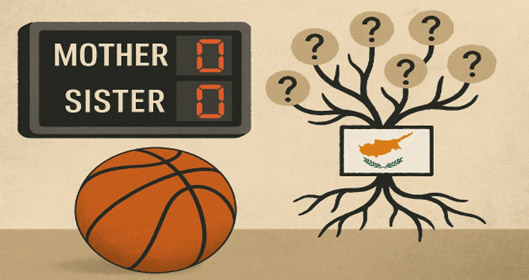By Flora Alexandrou
As scholars remind us, national identity is not a fixed concept, nor does it have a single agreed interpretation. It shifts with time, place and circumstance, and what seem like solid markers are often just “provisional stabilities” concealing a fractured and fluid reality.
In Cyprus, nothing shows this fluidity better than a basketball game. At the EuroBasket 2025 in Limassol, some politicians entered as so-called Cypriots and left as pure Hellenes -Karyatides and Kouroi – posing for history on the parquet.
The game was never about winning or losing. What mattered was that Cyprus “faced” Greece and a common anthem echoed through the arena. In this all-star political spectacle, rebounds turned into history, three-pointers into national pride, and the scoreboard into the altar of identity.
Cyprus’ national identity has always been fragile, and politicians have long exploited that fragility for votes. By tying Cypriot identity to Greece on the basketball court and to endless family metaphors, they recycled the very nationalism that history shows as Cyprus’ most destructive force. And nationalism, as Europe’s past makes clear, is never just “pride”: it feeds on enemies, feeds on conspiracies and survives by inventing the myth of a besieged and “pure” people.
Elsewhere identity is rarely simple, but in Cyprus it is a maze. On paper we are “Cypriot”, yet that identity is fragmented between Greek Cypriots and Turkish Cypriots, while politicians on both sides keep rewriting the playbook: Greece the mother, Turkey the mother.
And new relatives keep appearing. A few months ago in Beirut, President Nikos Christodoulides called Lebanon our “brother”. Weeks earlier, Greece was not a mother but a sister. The result is less a family tree than a family mess, where everyone claims a role and no one knows their place. If everyone is family, where does that leave Cyprus? The eternal orphan, the sidekick, the over-eager cousin desperate for an invitation to dinner? The metaphors multiply, but clarity about Cypriot identity never does.
Back on the Cyprus-Greece game, House president Annita Demetriou’s Facebook hymnography made the EuroBasket match sound like Thermopylae with three-pointers: ‘Hearts beat Greek at every rebound. It is something more than a game. It is history, it is national pride, it is the ‘we.’ It is our common national anthem.’ And for government spokesman Konstantinos Letymbiotis, it was nothing short of holy revelation: ‘Two teams, one anthem, 6,000 fans… a moment that transcends sport.’ Translation: nationalism in sportswear. Amid such fervour, a possible appearance of Elam as cheerleaders with pompoms would hardly have been out of place, always ready to cheer louder for Greece than for Cyprus.
National identity can be healthy: languages, culture, history, the things that bind communities. But nationalism is counterfeit glue: it offers belonging to the rootless, then convinces them their greatest quality is membership in a “people” with one homeland and many enemies. In Cyprus, where even the homeland is divided, this poisonous mix has already done irreversible damage.
Defenders may argue: don’t we already speak Greek, share the same religion, the same traditions? Or isn’t it moving when 6,000 people sing together? That may feel like unity. Perhaps. But Cyprus is not Greece. It is a bicommunal state with its own constitution, its own fragile balance, and citizens who deserve clarity, not borrowed symbols. Unity is not identity.
A Cypriot identity sung to someone else’s anthem is not strength; it is the orphan borrowing another family’s lullaby.
Cyprus must own its national identity: clear, confident and free from borrowed symbols. It should unite citizens in their own story, not confuse them in someone else’s. Until leaders realise this, Cyprus will remain trapped in a carousel of substitutions instead of building its own dignity.
Flora Alexandrou works for the Spanish news agency EFE in Nicosia






Click here to change your cookie preferences